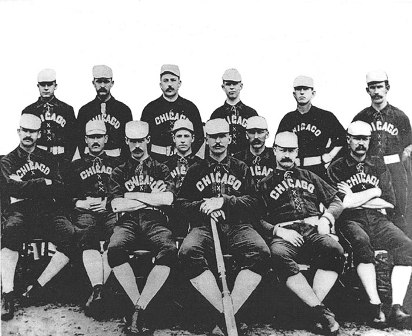Ten years before Rube Foster organized it in 1920, Jack T. Jackson called for the creation of the Negro National League. Johnson was variously nicknamed “Topeka Jack,” “Chicago Jack,” and “Kansas Jack,” and was occasionally confused with another Jack Johnson, the World Heavyweight Champion who also dabbled in baseball—“Topeka” Jack also did some boxing, further confusing the issue.
As a result of the common name and the confusion with his more famous namesake, there is very little biographical information available about him and no information survives regarding his birth or death, but for about a decade at the beginning of the 20th Century, he was an important figure in black baseball.
A shortstop and outfielder, he organized teams in Topeka before going north and joining the Chicago Union Giants, and then the Minneapolis Keystones. In 1909, he returned to Kansas to manage the Kansas City Giants, owned by Tobe Smith, and the following season he played for and managed the rival Kansas City (MO) Royal Giants owned by Kansas City businessmen M.B. Garrett and George Washington Walden.
On the eve of the 1910 season, with two rival franchises in Kansas City, and Chicago’s Rube Foster and Frank Leland battling over control of the Leland Giants, Johnson attempted to form a Negro National League. He wrote an article which appeared in The Freeman, The Chicago Defender, and other papers:
“To my idea it will be one of the greatest things that has ever happened for the Negro, if it goes through. There is no one that knows from the actual experience, better than I, under what trying conditions the Negro has been existing in baseball…in other words it has been very discouraging for the colored player.”
Johnson said the teams suffered at the box office because games were arranged on an ad hoc basis and often clubs would “show up with about one-half of the lineup being green youngsters that had never played a game together before,” and said many great players had quit the game because of the lack of organization.
“I contend that these conditions are not likely to occur with the clubs of the league as each club would practically be intact the season through, would have something to fight for and each manager would consequently show more interest.
“It has certainly been proven from the big leagues on down to the minors, that there is nothing in the world that beats organized baseball and harmony. Of course we cannot expect to cope right along with the big leagues the first season or two, but we can follow their method and system as far as we go. Good judgment can be used in adopting a schedule in regard to the shortest jumps, conflicting dates with white league clubs, etc…From the fact that most cities of the league would put out good, strong clubs, would be attractions that would draw at any time and at any place where baseball is known at all. So many times the white fans have been heard to remark, ‘I would rather go to see those colored boys play than one of the big league games.’ To prove this look how they used to pass right by the White Sox gate at 39th Street to get to Auburn Park at 79th street to watch the Lelands.
“Then look at the prestige, standing and rating it will give each club under the heading ‘Negro National League.’ What a great thing it would be to have an official record and per cent kept of each club and player. Then we will not have to argue and squabble as to the real merits (of Negro League players).”
The type of league Johnson envisioned was a decade away.
Johnson and George Washington Walden would have a bitter split after the 1910 season with Johnson leaving the Royal Giants and returning to the Kansas City (KS) Giants—the two resolved their differences the following year, according to The Freeman:
“At last war in Kansas City has come to a happy ending. (Walden and Johnson) have at last got together and will give Kansas City the strongest baseball team she has ever had.”
The newly formed Kansas City club operated as an independent barnstorming team and faded away by the early teens; Jack Johnson also faded away, his date and place of death unknown.
In 1920, while the former Heavyweight Champion Jack Johnson was serving his sentence at Leavenworth, Kansas for violation of the Mann act, he fought two exhibition matches on November 25, knocking out a Chicago fighter named Frank Owens and then “sparring” four rounds with a fighter billed as “Topeka Jack Johnson.” Some sources have identified the fighter as the same “Topeka Jack,” but, at least, three different professional fighters (and likely more) used that name between 1900 and 1925, and none of the newspaper reports indicate it’s the same Johnson.






